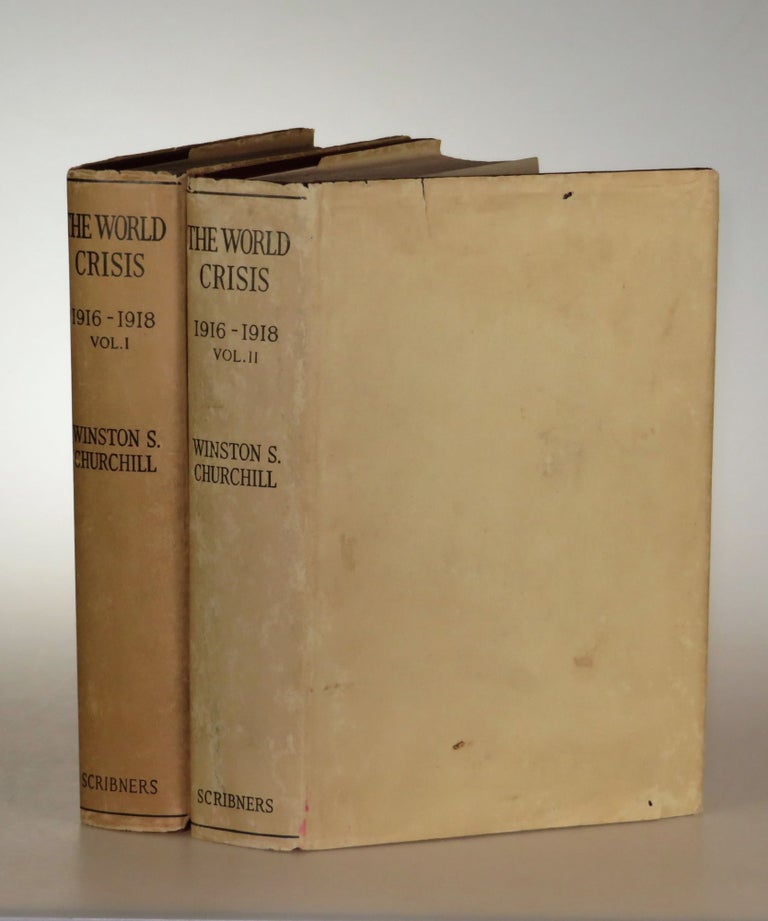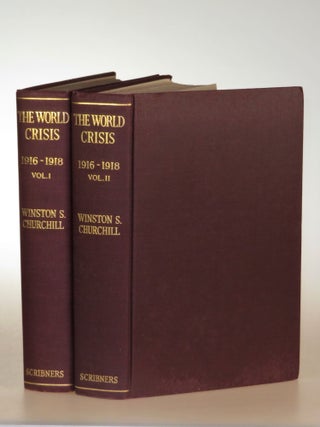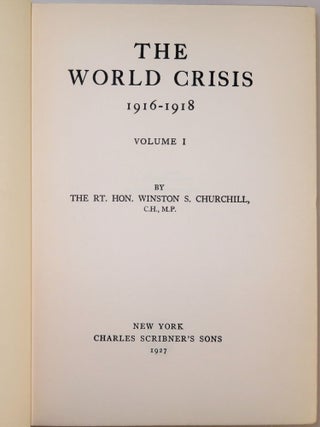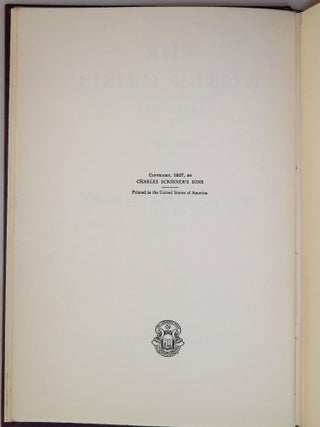The World Crisis, 1916-1918, Volumes I & II, in the original dust jackets
New York: Charles Scribner's Sons, 1927. First U.S. edition, first printing. Hardcover. This is a jacketed first edition, first printing set of the third and fourth volumes of Winston Churchill's monumental history of The First World War. A quarter of a century before the Second World War endowed him with lasting fame, Winston Churchill played a uniquely critical, controversial, and varied role in the “War to end all wars”. Then, being Churchill, he wrote about it.
The World Crisis was originally published in six volumes between 1923 and 1931, with the first four volumes spanning the war years 1911-1918 and the final two volumes covering the postwar years 1918-1928 (The Aftermath) and the Eastern theatre (The Eastern Front). These U.S. first edition 1916-1918 volumes were published as a pair, subtitled respectively “Volume I” and “Volume II”. The events of the 1916-1918 volumes include Churchill's time at the Front, his return to the Cabinet, and Armistice Day, marking the formal end of hostilities.
Unusual among Churchill’s many published books, the U.S. first edition of The World Crisis initially preceded the British, making it the true first edition. Unfortunately, the russet cloth of the U.S. first edition, particularly that of the first volume, proved quite susceptible to spine toning in the absence of the original dust jackets - which, of course, are elusive.
Here is a pair, fine and near fine respectively, in very good plus dust jackets. The bindings remain bright and clean as only jacketed copies are. The sole exterior defect we find is a little mottling/faint discoloration of the cloth at the upper and lower edges of the Part II covers. Shelf presentation of both volume spines is nearly flawless. The contents of both volumes are quite clean, crisp and bright with no spotting. The sole previous ownership mark we find is “Gerald E. Hatton | Toronto” ink-stamped in red at the upper left of the Volume I half-title. Both dust jackets are unclipped, retaining the original "$10.00 Two Volumes” front flap prices and substantially complete, lightly toned and soiled with only fractional loss at the upper spines and the bottom edge of the Volume II rear face. Both jackets are now protected beneath removable, clear, archival covers.
In October 1911, aged 36, Winston Churchill was appointed First Lord of the Admiralty. He entered the post with the brief to change war strategy and ensure the readiness of the world’s most powerful navy. He did both. Even Secretary of State for War Lord Kitchener, with whom Churchill had been variously at odds for nearly two decades, told Churchill on his final day as First Lord “Well, there is one thing at any rate they cannot take from you. The Fleet was ready." (The World Crisis: 1915, p.391) Nonetheless, when Churchill advocated successfully for a naval campaign in the Dardanelles that ultimately proved disastrous, a convergence of factors sealed his political fate. Churchill was scapegoated and forced to resign, leaving the Admiralty in May 1915. Years later, Churchill’s wife, Clementine, recalled to Churchill’s official biographer “I thought he would never get over the Dardanelles; I thought he would die of grief.” (Gilbert, Vol. III, p.473)
By November, Churchill resigned even his nominal Cabinet posts to spend the rest of his political exile as a lieutenant colonel leading a battalion in the trenches at the Front. Before war's end, Churchill was exonerated by the Dardanelles Commission and rejoined the Government, foreshadowing the political isolation and restoration he would experience two decades later leading up to the Second World War. And, of course, Churchill famously returned to the Admiralty in September 1939. Despite Churchill's political recovery, the stigma of the Dardanelles lingered. Hence Churchill had more than just literary and financial compulsion to write his history.
References: Cohen A69.1(III-1&2).a, Woods/ICS A31(aa), Langworth p.103. Item #005104
Price: $1,200.00





